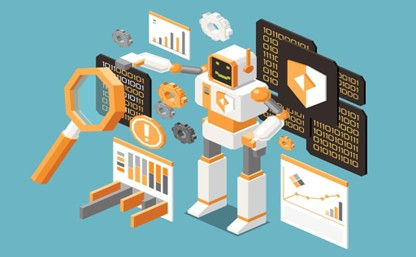The Intersection of AI and Cybersecurity in Gaming: Protecting Players and Platforms
- Shilpi Mondal

- Sep 17, 2025
- 4 min read
SHILPI MONDAL| DATE: MARCH 05,2025

The gaming industry has experienced exponential growth over the past decade, evolving into a multi-billion-dollar sector that attracts millions of players worldwide. This rapid expansion, however, has made gaming platforms prime targets for various cyber threats, including cheating, fraud, and Distributed Denial-of-Service (DDoS) attacks. To counter these challenges, the integration of Artificial Intelligence (AI) into cybersecurity measures has become essential, offering innovative solutions to protect both players and platforms.
AI's Role in Enhancing Gaming Experiences
AI has revolutionized the gaming landscape by enabling dynamic and personalized experiences. Developers utilize AI to create adaptive game mechanics, intelligent non-player characters (NPCs), and tailored content that responds to individual player behaviors. This adaptability not only enriches gameplay but also fosters deeper player engagement. For instance, AI-driven procedural content generation allows for the creation of expansive game worlds without manual input, offering unique experiences to each player. Moreover, AI algorithms analyze player data to adjust difficulty levels in real-time, ensuring a balanced and challenging environment.
Unique Cybersecurity Challenges in the Gaming Industry
Cheating and In-Game Exploits
Cheating undermines the integrity of games, leading to unfair advantages and a degraded player experience. Advanced cheats, such as aimbots and wallhacks, have become increasingly sophisticated, making them harder to detect with traditional methods. The rise of AI-driven cheating tools further exacerbates this issue, as they can mimic human behavior, evading standard detection systems.

Fraud and Account Takeovers
The gaming industry's extensive use of virtual currencies and in-game purchases has made it a lucrative target for fraudsters. Cybercriminals employ tactics like phishing and credential stuffing to gain unauthorized access to player accounts, leading to financial losses and compromised personal information.
Distributed Denial-of-Service (DDoS) Attacks
Gaming platforms frequently suffer from DDoS attacks, where malicious actors overwhelm servers with excessive traffic, causing disruptions and downtime. These attacks not only affect the gaming experience but also result in significant financial losses for companies. Notably, the gaming industry has been identified as one of the most targeted sectors for DDoS attacks.
AI Solutions Combating Cybersecurity Threats

AI-Powered Anti-Cheat Mechanisms
To address sophisticated cheating methods, developers are implementing AI-driven anti-cheat systems. These systems analyze player behavior in real-time, identifying patterns indicative of cheating. For instance, Riot Games' Vanguard system for "Valorant" operates at the kernel level, effectively detecting and preventing unauthorized access to game mechanics. Similarly, platforms like Anybrain offer AI-powered solutions to ensure fair play across various gaming platforms.
Fraud Detection and Prevention
AI algorithms enhance fraud detection by monitoring transactions and login attempts for anomalies. Machine learning models can identify unusual behavior patterns, such as rapid purchases or logins from different geographic locations, triggering alerts for potential fraudulent activity. This proactive approach helps safeguard player accounts and financial information.
Mitigating DDoS Attacks
AI plays a crucial role in defending against DDoS attacks by analyzing network traffic in real-time to distinguish between legitimate users and malicious actors. Advanced systems can detect and filter out malicious traffic, ensuring the stability and availability of gaming servers. Companies like A10 Networks have developed techniques such as real-time packet watermarking to enhance gaming defenses against such threats.
Case Studies: AI in Action
STEPN's Anti-Cheat Mechanism
STEPN, a Web3 lifestyle app, implemented an AI-based anti-cheat system to combat fraud on its platform. Recognizing the importance of maintaining a fair economy, STEPN leveraged AI to detect and prevent cheating, ensuring a secure environment for its users.

Valorant's Vanguard System
Riot Games' "Valorant" has been successful in reducing cheating through its Vanguard system, an AI-driven anti-cheat solution that operates at the kernel level. This approach has set a new standard in the industry, demonstrating the effectiveness of AI in maintaining fair play.
Future Outlook
As cyber threats continue to evolve, the gaming industry must remain vigilant and adaptive. The integration of AI into cybersecurity strategies offers a dynamic defense mechanism capable of learning and responding to new threats in real-time. By leveraging AI, gaming companies can protect their platforms and players, ensuring a secure and enjoyable gaming experience for all.
Conclusion
In conclusion, the intersection of AI and cybersecurity in gaming is pivotal in addressing the unique challenges faced by the industry. Through continuous innovation and implementation of AI-driven solutions, the gaming sector can effectively combat cheating, fraud, and DDoS attacks, safeguarding the integrity of games and the trust of players.
Citations:
Paramonov, A., & Paramonov, A. (2025, January 24). The Challenges of AI in Gaming: Security and ethics. Whimsy Games. https://whimsygames.co/blog/the-challenges-of-ai-in-gaming-security-and-ethics/
Ruck, R. (2024, July 17). Cybersecurity in online gaming: Protecting players and data. Word Street Journal. https://wordstreetjournal.com/cybersecurity-in-online-gaming-protecting-players-and-data/
Securedebug. (2023, December 11). Cyber security in online gaming platforms: Cybersecurity measures and best practices - Secure Debug: Cyber. Secure Debug: Cyber Security Services. https://securedebug.com/protecting-online-gaming-platforms-cybersecurity-measures-and-best-practices/
Nigro, P. (2024, December 17). The intersection of cybersecurity and artificial intelligence. Security Magazine. https://www.securitymagazine.com/articles/100312-the-intersection-of-cybersecurity-and-artificial-intelligence
The Future of DDOS Protection: AI and machine learning to combat Cyber attacks. (n.d.). https://www.iplocation.net/the-future-of-ddos-protection-ai-and-machine-learning-to-combat-cyber-attacks
Flowsec_Admin. (2025, March 3). The AI Arms Race in DDoS: Offensive vs. Defensive Strategies. Flowsec Cybersecurity - SaaS DDoS Protection and Network Security for CSP / ISP, MSSP & Enterprise. https://flow-sec.com/the-ai-arms-race-in-ddos-offensive-vs-defensive-strategies/
Image Citation:
Securing the virtual realm: Cybersecurity in the gaming industry - Cybersecurity Centre of Excellence (CCOE). (n.d.). Cybersecurity Centre of Excellence (CCoE). https://ccoe.dsci.in/blog/securing-the-virtual-realm-cybersecurity-in-the-gaming-industry




Comments